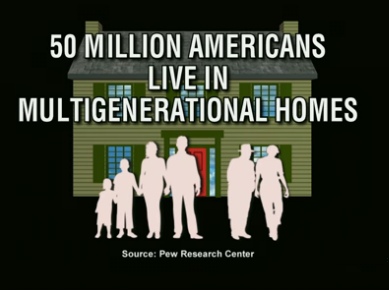 |
| Problem or solution? multigenerational homes |
For the first time in history, two generations of retirees are coexisting within a single family, as baby boomers retire while their elderly parents are still alive. [bold added]Who is helping the aged with their myriad health, financial, and life-planning problems when there's no family around? Why, bankers, of course.
Eldercare programs are now being offered by firms such as Bank of America’s U.S. Trust and Merrill Lynch, Wells Fargo Private Bank, Morgan Stanley, and Northern Trust. Such programs build contingency plans that involve organizing all of an elderly client’s information in the event that he or she becomes incapacitated; overseeing and paying medical bills; navigating coverage issues associated with Medicare and the Affordable Healthcare Act, or Obamacare; vetting in-home care; evaluating long-term care facilities; and even managing the sale of a home.Eldercare services are expensive for banks to provide, and wealthy clients (those with at least $2 million to $5 million under management, depending on the bank) often pay an extra fee. In some cases the benefits seem well worth the expense.
LITA ASKANAS, 78, was a Wells Fargo private-bank client when, three years ago, her husband, Charles, then 81, was told he had dementia....The couple’s Wells Fargo financial advisor suggested they meet with Mia Hernandez, one of the bank’s Life Management Services specialists, who came to their Saratoga, Calif., home to discuss how she might help.Having a guide to navigate these confusing, important, emotional issues is currently out of the reach of the non-wealthy majority.
Hernandez went to work on the Askanas’ medical bills, found a home health-care provider to help with Charles, and a tax preparer to handle the couple’s taxes. When Lita couldn’t find her Social Security documents, Hernandez came to their house, went through their computer to find the information, and reordered the necessary documents. When the couple decided to take a last cruise before Charles’ condition deteriorated, says Lita, “I called Mia and said, ‘I’m going on a trip but my passport has expired. What do I do?’ Mia came to the house, got my picture, and had my passport rushed.”
When Charles’ condition went beyond home- care capabilities, Hernandez accompanied Lita, helping her find a suitable facility for him. No small thing: Charles had a form of dementia that often results in aggressive and violent behavior, making placement in a home difficult. In February, Charles passed away.
However, we are confident that the tech revolution will come to eldercare as it has to every other aspect of life, and that decision-making tools and knowledge of best eldercare practices will soon be available to everyone. (No more than ten years from now, please, when we will be needing them.)
No comments:
Post a Comment